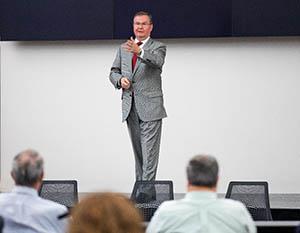Assistant Secretary for Fossil Energy Steven Winberg said collaboration – particularly with university partners – will be critical in achieving robust fossil energy goals he outlined to meet U.S. energy demands, stimulate the nation’s economy and promote responsible stewardship of the environment.
Winberg detailed his agenda for the U.S. Department of Energy’s (DOE) Office of Fossil Energy (FE) at the first annual technical review meeting of the University Coalition for Fossil Energy Research (UCFER), held April 16-17 at NETL. The Coalition is a six-year, $20 million initiative funded by DOE, through NETL, to address fundamental research challenges that limit the advancement of fossil energy-based technologies. Representatives from NETL and 16 partner schools attended the meeting to conduct Coalition business, review ongoing projects and discuss future research possibilities.
“We’re focused on early-stage research, and you are the beginning of that early-stage research,” Winberg said. “I want to take this opportunity to thank you for everything that you do. It’s clearly a high-value proposition – not only for fossil energy, but for the Department of Energy and for the country at large. I think it’s pretty impressive that there are 16 premier universities in this Coalition. … It speaks to an ability for universities to collaborate. I know you also compete, but you can and you do collaborate. And that’s powerful. I encourage it, and I think you need to keep that up.”
Winberg outlined key goals for FE to help inform research conducted by the Coalition. Beginning with coal, Winberg said FE plans to improve reliability of the existing fleet of coal-fired power plants and develop advanced technologies necessary for the next generation. He noted that most of today’s coal-fired power plants were built in the 1970s, and many are operating differently than they were designed to function roughly 40 years ago. To enhance the existing fleet, FE plans to develop new technology that boosts efficiency and reduces carbon dioxide emissions. He supported continuing work to develop better sensors and controls and advanced materials, while noting that his team is working on addressing policy issues that limit improvements to existing power plants.
Coal consumption hit its peak in 2007-08, at about 1.1 billion tons. Winberg said coal usage for power generation has declined to approximately 650 million tons today and is projected to drop to less than 500 million tons from 2030-40. He said the only way to keep production up is to prepare technology for the next generation of coal-fired power plants and cited specific criteria: They must be small and modular, capable of producing somewhere between 50-350 megawatts of electricity; they must increase efficiency, operating at high temperatures and pressures; and they must be able to load follow. Winberg also suggested pursuing combined heat and power plants, which exploit residual steam for heating and cooling use to boost efficiency.
Winberg’s primary goal for natural gas is tied to the vast amount of data gathered in the last 12 years or so – particularly through shale gas exploration. Much of that data has been proprietary and not widely released, due to competition within the industry. However, Winberg noted that by working in concert with industry stakeholders to gain access to their data, advanced software computing and analytics may be used to gain better understanding and knowledge that can be leveraged to increase productivity for the nation. He mentioned that DOE’s high-performance computing capability could identify ways to increase efficiency and consistency in hydraulic fracturing. Boosting shale gas recovery from 10 percent to 20 percent may be possible. But realizing even a fourth of that potential increase would be “game-changing,” he said.
Winberg said FE is still very much focused on CCUS – particularly carbon capture, as it accounts for roughly 75 percent of total CCUS implementation costs. “That’s where I think the universities can come in and play in a very real way. I would like to get that [carbon capture] cost down by 50 percent,” he said. Driving the cost down will open up additional opportunities for CCUS, which he said will be essential in achieving global climate goals.
Winberg said collaboration among everyone involved in energy research – including DOE’s offices, industry representatives and university partners – offers distinct advantages in achieving fossil energy goals. “When you work in a collaborative way, things get done quicker. But, more importantly, I think it’s a lot more fun. It’s a lot more interesting,” he said.
In response to a question from a UCFER meeting attendee, Winberg also noted the importance of collaboration in getting younger people involved in fossil energy research. He encouraged universities to reach out to lawmakers to seek investments in fossil energy research that might spark student interest, and he said the energy industry needs to make students aware of the demand and opportunities within the field.
“They’ll see there’s a future because coal is not going away, oil is not going away, and natural gas isn’t going away in this country, much less around the world,” Winberg said.
Contact:




